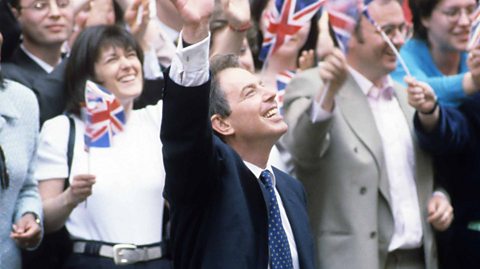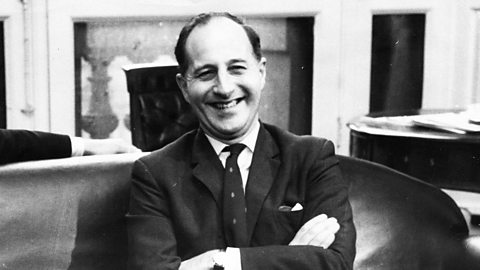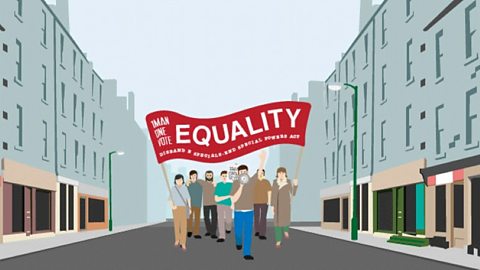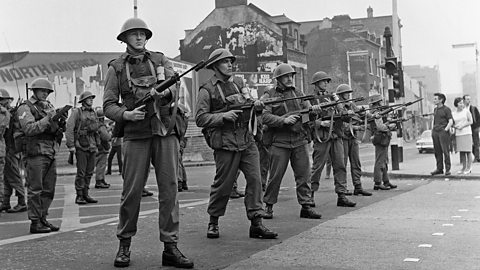All party talks?

After winning the May 1997 UK general election, the new Labour government ÔÇô led by Tony Blair ÔÇô attempted to get the peace process moving again.
Blair announced that if the Provisional Irish Republican Army (PIRA)Irish republican paramilitary group formed when members split from the Official IRA (OIRA) in 1969. renewed its ceasefire, Sinn F├ęinAn Irish republican party. Founded in Dublin in 1905, Sinn F├ęin came to prominence in the aftermath of the 1916 Easter Rising. Its subsequent growth in popularity led to Sinn F├ęin candidates winning the majority of Irish seats in the December 1918 General Election. Subject to a number of splits in subsequent years, the party maintained its association with the Irish Republican Army (IRA) and, post-1969, the Provisional Irish Republican Army (PIRA).. could enter talks.
The PIRA ceasefire was duly renewed on 20 July 1997 and Sinn F├ęin entered the talks in September 1997, having also signed up to the Mitchell principleA rule, belief, or idea that acts as a guide. of non-violence.
Sinn F├ęinÔÇÖs entry into talks caused potential problems within the Irish republicanA person who wants to establish an all Ireland republic completely independent of Britain. movement.
In an effort to ensure that the PIRA did not return to violence during negotiations, a General Army Convention was organised.
This meeting agreed that the PIRAÔÇÖs Army Council (which the Sinn F├ęin leadership allegedly controlled) could decide on possible concessions.
Sinn F├ęinÔÇÖs entry led to the Democratic Unionist Party (DUP)A conservative and unionist party in Northern Ireland, formed in 1971 by the Rev Ian Paisley. The party has strongly opposed any role for the Republic of Ireland in the governing of Northern Ireland. From 1971-1998, it opposed the 1973-1974 Power Sharing Assembly and Executive, the Anglo-Irish Agreement and the Good Friday Agreement. and the United Kingdom Unionist Party (UKUP) leaving the talks.
Both parties refused even to consider proximity negotiations (meaning they would not have to meet face to face), a position that was not shared by the Ulster Unionist Party (UUP)Formed in 1905 as the Ulster Unionist Council. Following the partition of Ireland, the UUP was the governing party of Northern Ireland between 1921 and 1972. The UUP was the largest unionist party when the Good Friday Agreement was signed in 1998. or the loyalist parties.
Negotiations
The negotiations were based around three strands:
- Strand One would focus on a new governmental structure for Northern Ireland.
- Strand Two would be concerned with cross-border relations between the two parts of Ireland.
- Strand Three would deal with BritishÔÇôIrish relations.
An Independent International commissionA group of people given the task of investigating or solving something by the government. on decommissionTo deactivate or remove in a safe manner. was also set up under the chairmanship of Canadian General John de Chastelain.
On Friday 10 April 1998, Good Friday, it was announced that agreement had been reached.
In the final stages, not only did Blair and the TaoiseachThe prime minister of the Republic of Ireland (formerly Éire). The word is Irish for chieftain., Bertie Ahern, join the negotiations, but US President Bill Clinton played his part by telephone.
Key terms of the Good Friday Agreement
| Strand | Outcome |
|---|---|
| One | Established a 108-member assemblyAnother name for a parliament. , elected by proportional representationAn electoral system in which parties gain seats in proportion to the number of votes cast for them., with full legislativeHaving the power to make laws. and executiveSupreme authority. authority over areas previously administered by the Northern Ireland Office. |
| Two | Created a NorthÔÇôSouth Ministerial Council responsible for cross-border co-operation in a range of areas. |
| Three | Set up a BritishÔÇôIrish Council with members from all parliaments/assemblies within the British Isles. Its purpose was to enable consultation and co-operation in a range of areas. Also established a BritishÔÇôIrish Intergovernmental Conference with responsibilities similar to the institutions set up by the 1985 Anglo-Irish Agreement. |
Other terms
- The Irish government agreed to renounce its constitutionRules by which a country is organised and governed. claims to Northern Ireland as contained within Articles II and IIIArticle II of the 1937 Irish constitution claimed the right of the Irish government to rule over the whole island. Article III of the constitution added that, until partition ended, ├ëireÔÇÖs laws would only apply to the 26 counties currently governed by Dublin. of the Bunreacht na h├ëireannNew constitution of ├ëire in 1937. A constitution sets out the rules by which a country is organised and governed..
- The British Government agreed to replace the Government of Ireland ActLegislation, passed in 1920, which established Northern Ireland..
- There were also to be prisoner releases, alongside paramilitaryA person or organisation that operates like a military force, but is not part of a country's official armed forces. decommissionTo deactivate or remove in a safe manner..
The Agreement also established an Independent commissionA group of people given the task of investigating or solving something by the government. on Policing, to create a police force that could attract the support of both communities.
The responses to the Good Friday Agreement
The Democratic Unionist Party (DUP)A conservative and unionist party in Northern Ireland, formed in 1971 by the Rev Ian Paisley. The party has strongly opposed any role for the Republic of Ireland in the governing of Northern Ireland. From 1971-1998, it opposed the 1973-1974 Power Sharing Assembly and Executive, the Anglo-Irish Agreement and the Good Friday Agreement. and United Kingdom Unionist Party (UKUP)A small unionist party in Northern Ireland that existed from 1995 to 2008 and which opposed the Good Friday Agreement. opposition to any deal was already known, however now divisions started to emerge within the Ulster Unionist Party (UUP)Formed in 1905 as the Ulster Unionist Council. Following the partition of Ireland, the UUP was the governing party of Northern Ireland between 1921 and 1972. The UUP was the largest unionist party when the Good Friday Agreement was signed in 1998..
The first sense of this came when Jeffrey Donaldson ÔÇô one of the members of the UUP negotiating team ÔÇô walked out of the talks just as the deal was nearing completion.
In the event, six of the UUPÔÇÖs ten MPs opposed the Agreement.
In May 1998, anti-Agreement unionists ÔÇô including these anti-Agreement UUP MPs ÔÇô set up the United Unionist Campaign to co-ordinate their opposition.
Their slogan was ÔÇśItÔÇÖs right to say no.ÔÇÖ
On 30 April 1998, the Provisional Irish Republican Army (PIRA)Irish republican paramilitary group formed when members split from the Official IRA (OIRA) in 1969. announced that the Agreement fell somewhat ÔÇśshort of presenting a solid basis for a lasting settlementÔÇÖ, and added that it would not decommissionTo deactivate or remove in a safe manner. its weapons.
However, a few days later, Sinn F├ęinAn Irish republican party. Founded in Dublin in 1905, Sinn F├ęin came to prominence in the aftermath of the 1916 Easter Rising. Its subsequent growth in popularity led to Sinn F├ęin candidates winning the majority of Irish seats in the December 1918 General Election. Subject to a number of splits in subsequent years, the party maintained its association with the Irish Republican Army (IRA) and, post-1969, the Provisional Irish Republican Army (PIRA).. leaders told their supporters to back the Agreement.
At the party conference (Ard Fheis), members voted to allow members to take seats in the new Assembly.
The referendums
On 22 May 1998, referendumWhen a question is decided by putting it to a public vote. were held on both sides of the border to determine the electorateÔÇÖs support for the Agreement.
Within Northern Ireland, 71.12 per cent of those who voted indicated their support for the Agreement.
The overall turnout was 80.98 per cent, a figure significantly higher than that produced at most elections.
It seemed that close to 97 per cent of nationalistPeople who believe their country should be independent from other nations. For example, Irish nationalists, who want Ireland to be fully independent of Britain. supported the Agreement while the comparable figure for unionistA person who believes the union between Britain and Northern Ireland should continue. was about 52 per cent.
The figures in the Republic were even clearer.
There, 94.4 per cent agreed with the governmentÔÇÖs plans to amend Articles II and IIIArticle II of the 1937 Irish constitution claimed the right of the Irish government to rule over the whole island. Article III of the constitution added that, until partition ended, ├ëireÔÇÖs laws would only apply to the 26 counties currently governed by Dublin. of the Irish constitutionRules by which a country is organised and governed..
The new Assembly
Elections for the new assemblyAnother name for a parliament. were held in late June 1998.
The results seemed to suggest that a clear majority of members elected supported power-sharing (75 per cent of the votes resulting in 80 out of 108 seats); however this failed to take account of two things:
- Not all of the 28 Ulster Unionist Party (UUP)Formed in 1905 as the Ulster Unionist Council. Following the partition of Ireland, the UUP was the governing party of Northern Ireland between 1921 and 1972. The UUP was the largest unionist party when the Good Friday Agreement was signed in 1998. members elected were in favour of the Agreement ÔÇô even though the UUP was meant to be pro-Agreement.
- The Agreement stated that certain decisions required majority support from both nationalistPeople who believe their country should be independent from other nations. For example, Irish nationalists, who want Ireland to be fully independent of Britain.and unionistA person who believes the union between Britain and Northern Ireland should continue. communities. Given the fine balance between pro- and anti-Agreement unionist support, that might be difficult to achieve.
The new Assembly met for the first time on 15 July 1998.
David Trimble, UUP Leader, and Seamus Mallon, SDLP Deputy-Leader, were elected as First and deputy First Ministers (Designate).
For more information, including archive clips, on this subject, visit 91╚╚▒Č: Ten Chapters of the Northern Ireland Troubles ()
Test your knowledge
More on Changing relations: Northern Ireland and its neighbours, 1965-98
Find out more by working through a topic
- count1 of 11

- count2 of 11

- count3 of 11
